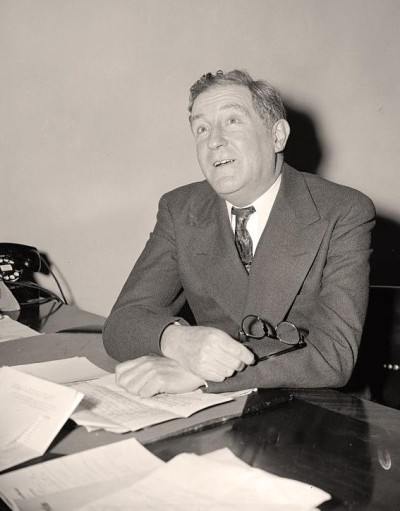Sheridan Downey (Sheridan Downey)

In 1938, Sheridan Downey ran for the U.S. Senate as a supporter of the proposed “Ham and Eggs” government pension program. He defeated incumbent Senator William Gibbs McAdoo, the former son-in-law of Woodrow Wilson, in the Democratic primary by more than 135,000 votes. Despite the strong backing McAdoo received from the White House and a personal campaign appearance by President Franklin Roosevelt to endorse the incumbent, Downey won the primary and went on to victory in November, defeating Republican Philip Bancroft by a 54-46 percent margin. During the 1938 campaign, Downey appeared on the cover of Time. Though he had been considered a staunch liberal, Sheridan Downey as a senator became a conservative Democrat who won the support of California’s major oil interests. He supported the efforts of oil companies and agribusiness to procure state, rather than federal, control of California’s oil resources. He also worked to exempt the California Central Valley from the Reclamation Act of 1902, an action which assisted corporate farms. In the Senate, Downey also introduced a series of pension bills, and in 1941 he was named chairman of a special Senate committee on old-age insurance. He took an early stand supporting a military draft but opposed the Roosevelt administration’s plans to requisition industries in time of war. During World War II he called for the creation of a committee to investigate the status of blacks and other minorities in the armed forces and advocated a postwar United Nations, international control of atomic energy, increased veterans’ benefits, and federal pay raises. At the end of the war he opposed continuation of the military draft. During his years in the U.S. Senate Downey often represented the interests of California’s powerful motion picture industry. His shift from a liberal New Dealer to a conservative Democrat would become officially recognized after the war ended.
After his narrow reelection to the Senate in 1944, defeating Republican Lieutenant Governor Frederick F. Houser by 52 percent to 48 percent, Sheridan Downey began a push for the California Central Valley project, which had been initiated during the 1930s as part of the New Deal’s vast array of public works projects, such as power dams and irrigation canals. In a 1947 book entitled They Would Rule the Valley, Downey argued that the farmers of the Central Valley, who controlled water rights based on state law, would come into conflict with the federal Bureau of Reclamation. Downey acknowledged that Central Valley farmers were technically in violation of the Reclamation Act of 1902, but defended these violations of Federal law as necessary because, in the context of California agriculture the Federal limitation was impractical. Downey’s political views made him vulnerable. Helen Gahagan Douglas challenged him in a primary. 1950 Downey dropped out of the race, citing ill health, and threw his support in the Democratic primary behind Manchester Boddy, the conservative and wealthy publisher of the Los Angeles Daily News. He even indicated that if Douglas won the primary, which she did, he would support Republican U.S. Representative Richard Nixon in the general election. In the ensuing Douglas-Nixon race, Nixon prevailed in what his critics called a smear campaign. From this race, Nixon emerged with the sobriquet “Tricky Dick”. After he left the Senate, Downey practiced law in Washington, D.C., until his death in San Francisco in 1961.
Born
- March, 11, 1884
- USA
- Laramie, Wyoming
Died
- October, 25, 1961
- USA
- San Francisco, California
Cemetery
- Hill Crest Cemetery
- Holly Springs, Mississippi
- USA



